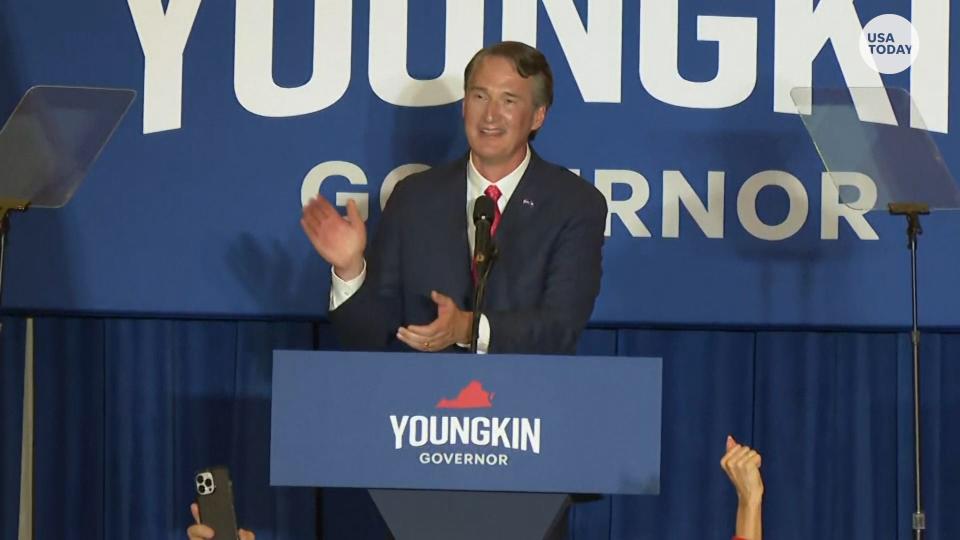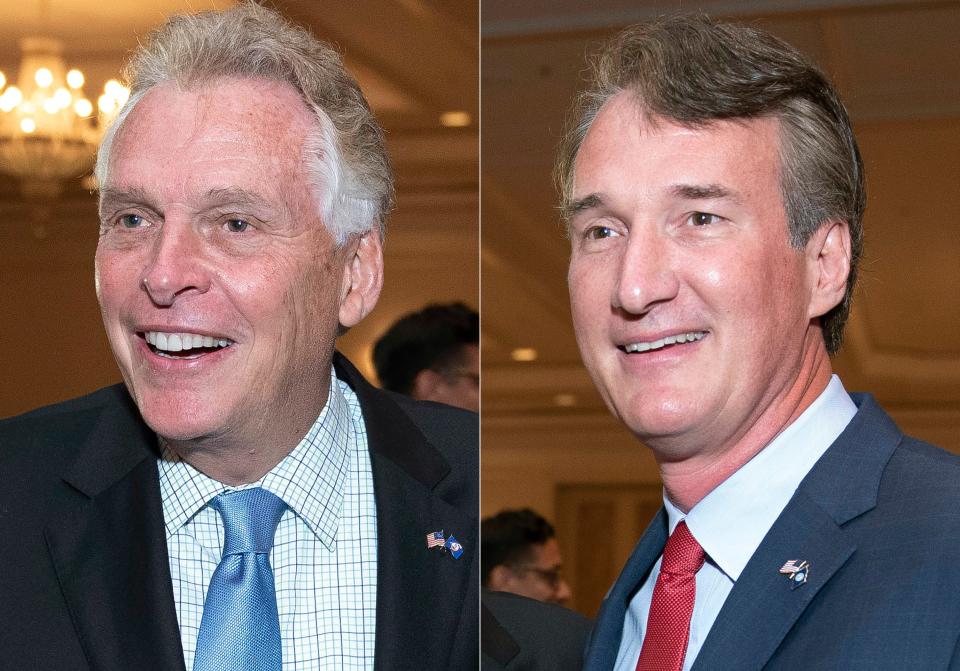Glenn Youngkin defeats Terry McAuliffe for Virginia governor, dealing Democrats a setback
- Oops!Something went wrong.Please try again later.
- Oops!Something went wrong.Please try again later.
- Oops!Something went wrong.Please try again later.
- Oops!Something went wrong.Please try again later.
WASHINGTON – Republican businessman Glenn Youngkin defeated ex-Gov. Terry McAuliffe in the Virginia governor's race Tuesday, dealing a rebuke to Democrats a year ahead of the 2022 elections that will decide control of Congress and other statehouses nationwide.
"How much fun!" said Youngkin, a decided underdog at the start of a campaign in which he stressed education, especially the teaching of race and history, and the economy, all issues that will loom large across the country in 2022.
"Together, we will change the trajectory of this Commonwealth," Youngkin told cheering supporters at a victory party in the early morning hours Wednesday. "Breakfast will be served shortly," he joked.
In years past, the Virginia gubernatorial election has been a bellwether for future races, and analysts said the issues that animated the Youngkin-McAuliffe race will resonate in 2022 and perhaps beyond.
They include the influence of President Joe Biden and predecessor Donald Trump, the turnout among suburban and Black voters and the salience of social issues like abortion and education policy.
More: Election results live updates: Tight NJ governor's race too close to call, Youngkin flips Virginia
Joe Biden vs. Donald Trump: The other Virginia governor's race

Earlier in the evening, as he closed the gap on Youngkin, McAuliffe declined to concede the race and told tearful supporters that "we've still got a lot of votes to count." The Democratic candidate had struck a wistful tone in an e-mail to supporters in which he cited the possibility of defeat.
“When the results of this election come in – win or lose – we can rest assured that we did everything we can to create the future that we want," McAuliffe said.
Virginia is unique in holding state government elections just one year after presidential elections. The only other gubernatorial election on Tuesday was in New Jersey, where incumbent Democrat Phil Murphy was locked in a surprisingly tight race with Republican Jack Ciattarelli.
Other elections across the country included two U.S. House races in Ohio and another U.S. House primary in Florida. There were also mayor's contests in major cities, including New York, Boston, Atlanta and Minneapolis.

In most of these races, Democrats and Republicans looked for clues on how to approach the 2022 elections, when control of Congress and many big state governments will be decided.
Where Youngkin gained ground
On the ground, Youngkin prospered by cutting into Democratic margins in suburban Virginia counties that went heavily for Biden and previous Democratic gubernatorial candidates.
Loudon County, the epicenter of disputes between parents and school boards, did go for McAuliffe, but only by 10.5 percentage points. Four years ago, victorious Democratic nominee Ralph Northam won by 19.9 percentage points.
McAuliffe also won Henrico County, near Richmond, by 17.9 percentage points – but Northam won it by 22.8 percentage points.
Youngkin also got a strong vote out of reliably Republican areas in western Virginia.
Election analyst Henry Olsen, a senior fellow at the Ethics and Public Policy Center in Washington, D.C., said that "Youngkin cut into Democratic margins among Asians and Latinos and some suburban whites, while getting Trump-level support among rural Virginians. That combination was enough for victory."
Biden's declining popularity apparently hurt McAuliffe in Virginia, analyst said, and could undercut Democratic candidates in other states next year.
"A first term president's approval rating is one of the best indicators of how their first midterm will go," said Jessica Taylor, the U.S. Senate and governors' editor with the Cook Political Report.
Given voter complaints about inflation, gas prices, border issues, the botched Afghanistan withdrawal, and inaction by a Democratic Congress, Taylor said: "How much of a drag is Biden on Democrats? Can he rebound in a year or will the drop continue?"
7 Things: What campaign '21 says about campaign '22 (including Biden, Trump and Black voters)
The Trump factor
Trump's continuing involvement in politics also played a role in the Virginia campaign and will likely be a factor in 2022.
McAuliffe sought to tie Youngkin to Trump's unpopularity in Virginia – he lost the state to Biden just last year by ten percentage points – and frequently described his opponent as a "Trump wannabe."
For his part, Youngkin embraced Trumpian issues – including tax cuts, de-regulation, "election integrity," and opposition to vaccine mandates – but kept his distance from the volatile ex-president himself. Unlike McAuliffe and Biden, Youngkin did not campaign with Trump in person.
"If Youngkin is able to win," Taylor said, "he could provide a blueprint for other Republicans in how to balance the Trump issue."
Education a top priority for voters
Youngkin also made an issue of public education during the Virginia campaign. He took up a number of parental protests against local school boards over items ranging from mask mandates to trans students to the teaching of racial issues, asserting parental rights.
The Republican candidate and his allies made much of a McAuliffe comment that "I don't think parents should be telling schools what they should teach." McAuliffe said he was referring to a specific incident in which he vetoed a law that would have allowed parents to ban books from school classrooms.
Voters listed education as among their top priorities, exit polls said, especially for Youngkin voters.
Bob and Judy Allen, retirees who have lived in Northern Virginia for 33 years and voted in Fairfax, said they backed Youngkin over parental rights in schools. Both said they want parents to be able to object to a curriculum that includes "critical race theory," for example.
“If my kids were to be educated right now, I wouldn’t put them in Fairfax County schools," Judy Allen said. "I would probably homeschool them. Teachers now are putting a political spin on everything and that’s not their place.”
Judy Allen also said she and her husband voted for Youngkin because “he’s not Terry McAuliffe, he’s not a Democrat."
Earlier in the day, Biden had predicted a McAuliffe win in Virginia. Speaking with reporters after a climate change summit in Glasgow, Scotland, Biden also said "the race is very close, so it's about who shows up, who turns out."
Trump, meanwhile, took credit for the Republican's victory, saying in a written statement: "I would like to thank my BASE for coming out in force and voting for Glenn Youngkin. Without you, he would not have been close to winning."
Trump and Biden proxy fight
Flying back from Scotland, Biden disembarked from Air Force One as Youngkin was claiming victory in the Virginia governor's race.Some voters in Virginia who trooped to the polls on a rainy Tuesday criticized the overbearing roles that Trump and Biden played in the race.
Michelle Merritt, 38, a realtor and a self-described Republican who voted in Stafford, Va., said that people are "voting on their own opinion and making their own opinion based on just that candidate, not the hatred or the love of another candidate.”
In assessing the national impact of Virginia, some analysts pointed to the 1993 gubernatorial win in Virginia by Republican George Allen, saying the win reflected voter backlash against President Bill Clinton and the Democrats.
One year later, the GOP won control of the U.S. House and Senate. Clinton, however, handily won re-election in 1996 amid voter displeasure with the Republican-run Congress.
Pollster Frank Luntz had described Virginia as an "early warning system" for Democrats ahead of 2022. Now, the party's loss is "a repudiation of the last year," he said.
Citing recent Democratic success in Virginia, Luntz said: "If they can’t hold on here, what else will they lose?"
Contributing: Courtney Degen and Jeannie Michele Kopstein, Medill News Service
This article originally appeared on USA TODAY: Democratic defeat: Youngkin beats McAuliffe for Virginia governor


